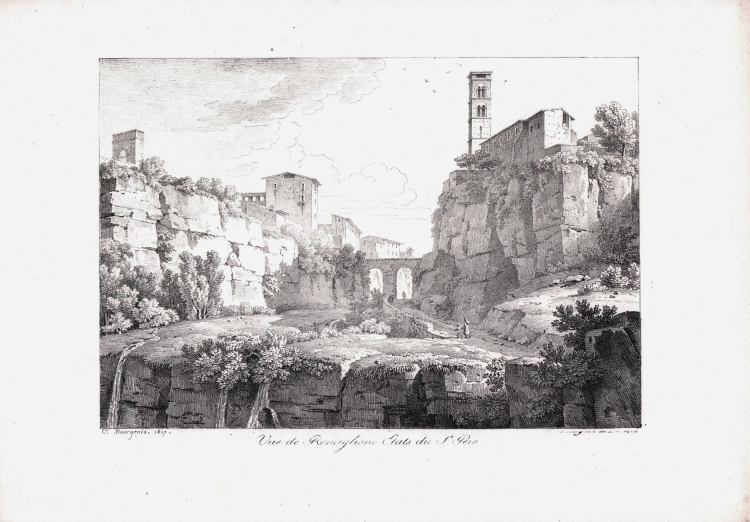



| Reference: | CO-837 |
| Author | Florent-Constant BOURGEOIS |
| Year: | 1817 |
| Zone: | Ronciglione |
| Printed: | Paris |
| Measures: | 285 x 200 mm |


| Reference: | CO-837 |
| Author | Florent-Constant BOURGEOIS |
| Year: | 1817 |
| Zone: | Ronciglione |
| Printed: | Paris |
| Measures: | 285 x 200 mm |
Litografia raffigurante la rocca e la città di Ronciglione, firmata e datata "C. Bourgeois 1817" in basso a sinistra.
Della serie Vues d'Italie, una raccolta di 28 litografie stampata da Charles Philibert du Saillant, Comte de Lasteyrie, nel 1817-1818.
Florent-Constant Bourgeois, detto “Bourgeois du Castelet” era originariamente un ufficiale militare. Bourgeois si dedicò esclusivamente all'arte a partire dalla metà degli anni '90, perfezionando la sua formazione nello studio di Jacques-Louis David, dove si specializzò in paesaggi e divenne soprattutto uno straordinario disegnatore; Paul Marmottan, nella sua "Ecole française de peinture, 1789-1830", fa riferimento alla sua " grande pureté de style et l’exécution brillante de ses dessins, la plupart très remarquables, notamment ceux au lavis". Molto ricercato e apprezzato durante la sua vita, Bourgeois ha ricevuto numerosi premi e riconoscimenti artistici, una casa al Louvre e la Legion d'onore nel 1827. Viveva al numero 3 di quai Malaquais a Parigi.
La sua attività di pittore è oggi meno conosciuta, eppure espose quadri in quasi tutti i Salon dal 1791 al 1830, con solo vedute dell'Italia per il periodo dalla Rivoluzione al Consolato.
Bellissima prova, in ottimo stato di conservazione.
Rara.
Bibliografia
IFF / Inventaire du Fonds Français: Bibliothèque Nationale, Département des Estampes (7.14).
Florent-Constant BOURGEOIS (Guiscard, 1767 - Passy, 1841)
|
Florent-Constant Bourgeois, known as "Bourgeois du Castelet," was originally a military officer. Bourgeois devoted himself exclusively to art from the mid-1790s, perfecting his training in Jacques-Louis David's studio, where he specialized in landscapes and became above all an extraordinary draughtsman; Paul Marmottan, in his "Ecole française de peinture, 1789-1830," refers to his " grande pureté de style et l'exécution brillante de ses dessins, la plupart très remarquables, notamment ceux au lavis." Highly sought after and appreciated during his lifetime, Bourgeois received numerous artistic prizes and awards, a house in the Louvre, and the Legion of Honor in 1827. He lived at No. 3 quai Malaquais in Paris.
His activity as a painter is less well known today, yet he exhibited paintings in almost every Salon from 1791 to 1830, with only views of Italy for the period from the Revolution to the Consulate.
|
Florent-Constant BOURGEOIS (Guiscard, 1767 - Passy, 1841)
|
Florent-Constant Bourgeois, known as "Bourgeois du Castelet," was originally a military officer. Bourgeois devoted himself exclusively to art from the mid-1790s, perfecting his training in Jacques-Louis David's studio, where he specialized in landscapes and became above all an extraordinary draughtsman; Paul Marmottan, in his "Ecole française de peinture, 1789-1830," refers to his " grande pureté de style et l'exécution brillante de ses dessins, la plupart très remarquables, notamment ceux au lavis." Highly sought after and appreciated during his lifetime, Bourgeois received numerous artistic prizes and awards, a house in the Louvre, and the Legion of Honor in 1827. He lived at No. 3 quai Malaquais in Paris.
His activity as a painter is less well known today, yet he exhibited paintings in almost every Salon from 1791 to 1830, with only views of Italy for the period from the Revolution to the Consulate.
|